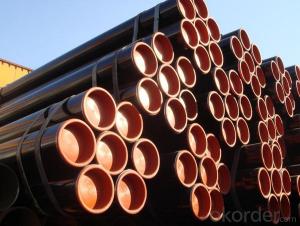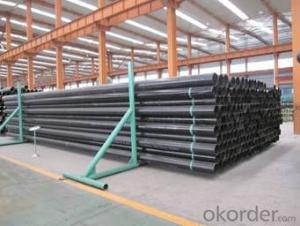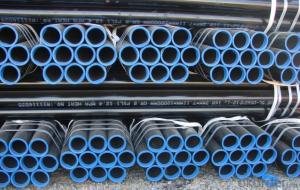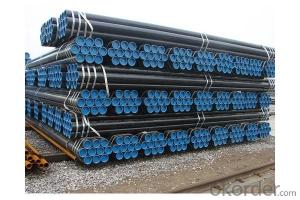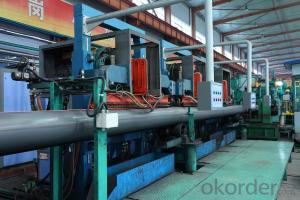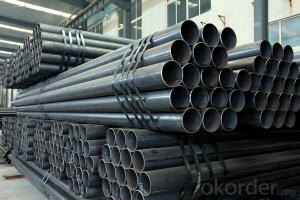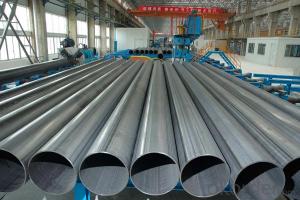ERW Casing and Tubing Line Steel Pipe
- Loading Port:
- China Main Port
- Payment Terms:
- TT OR LC
- Min Order Qty:
- -
- Supply Capability:
- -
OKorder Service Pledge
Quality Product, Order Online Tracking, Timely Delivery
OKorder Financial Service
Credit Rating, Credit Services, Credit Purchasing
You Might Also Like
ERW Casing and Tubing Line Steel Pipe
Product Description
API 5L standard line pipe form local Mills/factories qualified, with good perfromance and favoralbe price.
Our company have around 2000 tons stock for API 5L line pipe normal size, and we could order for you with the most favorable price from our cooperate mills.
We can supply Line pipe of ERW, LSAW, SSAW and seamless type as per your need.
Outside diameter: 21.3 to 720mm
Standard: API 5L.
Steel Grade: A, B, X42, X46, X52, X56, X60, X65 X70 etc.
Level: PSL1, PSL2.
Type: SMLS, Welded.
Packing: Labeled and bundled together with steel strip
Carbon Steel Pipe Type of pipe finish: Black paint on pipe, beveled or plain end with plastic cap.
Our company have around 2000 tons stock for API 5L line pipe normal size, and we could order for you with the most favorable price from our cooperate mills.
We can supply Line pipe of ERW, LSAW, SSAW and seamless type as per your need.
Outside diameter: 21.3 to 720mm
Standard: API 5L.
Steel Grade: A, B, X42, X46, X52, X56, X60, X65 X70 etc.
Level: PSL1, PSL2.
Type: SMLS, Welded.
Packing: Labeled and bundled together with steel strip
Carbon Steel Pipe Type of pipe finish: Black paint on pipe, beveled or plain end with plastic cap.
- Q: What is the outer diameter and wall thickness of the welded steel pipe of national standard DN250?
- DN250 is the nominal diameter, the outer diameter of the steel pipe is 273mm, the thickness is above 6.5mm.
- Q: How are steel pipes inspected for compliance with industry standards?
- Steel pipes are inspected for compliance with industry standards through various methods such as visual inspection, dimensional checks, non-destructive testing, and mechanical testing. Visual inspection involves examining the pipes for any visible defects or imperfections. Dimensional checks ensure that the pipes meet the required measurements and tolerances. Non-destructive testing techniques like ultrasonic testing, magnetic particle inspection, or radiography are used to detect any internal or surface defects. Mechanical testing involves conducting tests to verify the mechanical properties such as tensile strength, yield strength, and hardness of the pipes. These inspections ensure that the steel pipes meet the required industry standards and are safe for use.
- Q: How do you determine the pipe schedule for steel pipes?
- Several factors, including pressure rating, wall thickness, and outer diameter, are taken into account to determine the pipe schedule for steel pipes. The pipe schedule serves as a standardized system that classifies the thickness of pipe walls, ensuring compatibility and safety in various applications. To ascertain the pipe schedule for steel pipes, one must consider the maximum pressure the pipe will endure, typically measured in pounds per square inch (psi) or bars. The pressure rating indicates the pipe's ability to withstand pressure without experiencing failure or leakage. Higher pressure ratings necessitate thicker pipe walls. Another crucial factor in determining the pipe schedule is the wall thickness, typically expressed in inches or millimeters. The wall thickness directly correlates with the pressure rating, as thicker walls have the capacity to handle higher pressures. The American National Standards Institute (ANSI) has established a set of standardized wall thicknesses for steel pipes known as the "pipe schedule." The outer diameter of the pipe is also taken into consideration when determining the pipe schedule. The specific application and requirements influence the outer diameter variation. Selecting a pipe with the appropriate outer diameter is essential to ensure proper fit and compatibility with fittings, valves, and other components. In conclusion, the pipe schedule for steel pipes is determined by examining the maximum pressure, wall thickness, and outer diameter. By aligning these factors with the suitable pipe schedule, one can guarantee that the steel pipe is appropriate for its intended usage and capable of withstanding the required pressure.
- Q: Can steel pipes be used for irrigation systems?
- Yes, steel pipes can be used for irrigation systems. Steel pipes are known for their durability, strength, and resistance to corrosion, making them suitable for use in irrigation systems where they may be exposed to water and various environmental conditions. Additionally, steel pipes can handle high water pressure and are available in different sizes, allowing for efficient water distribution throughout the irrigation system.
- Q: How are steel pipes protected against ultraviolet (UV) radiation?
- Steel pipes are typically protected against ultraviolet (UV) radiation through the application of specialized coatings or paints that act as a barrier, preventing direct exposure of the steel to UV rays. These coatings are designed to withstand UV degradation, prevent corrosion, and extend the lifespan of the pipes.
- Q: What are the typical lengths of steel pipes?
- The typical lengths of steel pipes vary depending on the industry and application. However, common lengths for steel pipes range from 18 to 40 feet.
- Q: How are steel pipes inspected for quality control?
- Steel pipes are inspected for quality control through various methods such as visual examination, dimensional checks, non-destructive testing (NDT) techniques like ultrasonic testing, magnetic particle testing, and hydrostatic testing to ensure their structural integrity and adherence to specified standards.
- Q: How are steel pipes used in the manufacturing of machinery?
- Steel pipes are commonly used in the manufacturing of machinery for various purposes such as conveying fluids, gases, or solids, and providing structural support. They are used to transport materials within the machinery, including coolant, lubricants, and gases. Steel pipes also play a crucial role in creating the framework or structure of machinery, providing stability and strength. Additionally, they are used for creating pneumatic systems, hydraulic systems, and exhaust systems in machinery.
- Q: Can steel pipes be used for high-pressure applications?
- Yes, steel pipes can be used for high-pressure applications. Steel pipes are known for their strength and durability, making them suitable for handling high-pressure fluids, gases, or steam in various industries such as oil and gas, construction, and manufacturing. They are designed to withstand the high internal pressure and are commonly used in pipelines, steam systems, and hydraulic systems where the pressure requirements are significant.
- Q: How are steel pipes used in transportation?
- Steel pipes are commonly used in transportation for various purposes, such as in the construction of pipelines for transporting oil, gas, and water. They are also utilized in manufacturing vehicles, ships, and airplanes, where they serve as structural components or exhaust systems. Additionally, steel pipes are employed in the transportation of goods through conveyor systems and in the construction of railings and barriers for safety on roads and bridges.
Send your message to us
ERW Casing and Tubing Line Steel Pipe
- Loading Port:
- China Main Port
- Payment Terms:
- TT OR LC
- Min Order Qty:
- -
- Supply Capability:
- -
OKorder Service Pledge
Quality Product, Order Online Tracking, Timely Delivery
OKorder Financial Service
Credit Rating, Credit Services, Credit Purchasing
Similar products
Hot products
Hot Searches
Related keywords
